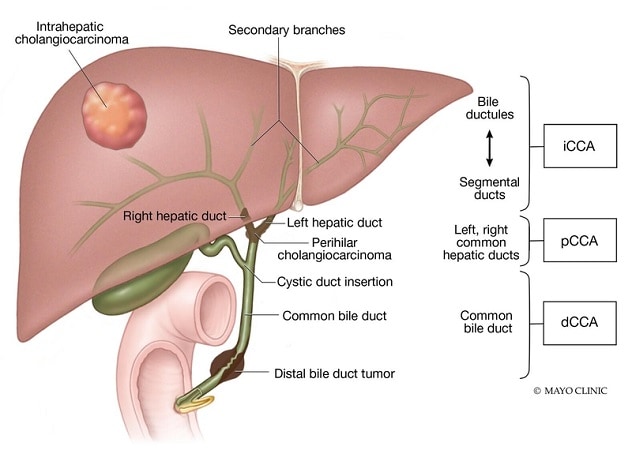Aug. 19, 2023
Cholangiocarcinoma (CCA) biliary tract malignancy is characterized by differentiation of cholangiocytes, the epithelial cells that line the intrahepatic and extrahepatic bile ducts.
The rising incidence of CCA in several countries and its high mortality rate have stimulated multiple research efforts focused on this disease. In a review article published in Nature Reviews Clinical Oncology in 2023, lead author Sumera I. Ilyas, M.B.B.S., and co-authors share pertinent scientific and clinical advances related to the diagnosis, staging and treatment of CCA. Dr. Ilyas is a transplant hepatologist at Mayo Clinic in Minnesota whose research focuses on the immunobiology of liver cancer.
The role of TIME in promoting tumor growth and progression
According to Dr. Ilyas and co-authors, CCAs have distinct tumor microenvironments (TIMEs). Using single-cell RNA sequencing and immunophenotyping, researchers have begun to reveal the complex heterogeneity of the CCA TIME, its relationship with distinct molecular subtypes of the disease, its correlation with patient prognosis and its modulation through immunotherapy.
Researchers describe the CCA microenvironment as poorly immunogenic, with a lack of cytotoxic immune cells and an abundance of immunosuppressive cell types, including myeloid-derived suppressor cells and tumor-associated macrophages. Efforts to better understand the abilities of the TIME to facilitate tumor growth and progression, immune evasion, and resistance to chemotherapy are an important part of improving CCA treatment outcomes.
Preclinical studies aimed at overcoming the immunosuppressive barriers in the TIME of CCA are providing insights into potential treatment strategies. Results from these studies suggest that efforts to alter the TIME in a way that favors cytotoxic elements may help improve anti-tumor response and the efficacy of immune checkpoint inhibitors (ICIs) and other immunotherapy approaches.
Advances in molecular diagnosis using blood and bile
According to Dr. Ilyas, early diagnosis and monitoring disease progression remain significant challenges in the management of patients with CCA. Assays measuring circulating tumor DNA (ctDNA) and cell-free DNA (cfDNA) are emerging as clinical tools for detection and monitoring of the disease.
"Efforts to identify better biomarkers to help diagnose the disease at an early stage and help gauge response to therapy are important," explains Dr. Ilyas. "Currently, there is a great deal of ongoing research focused on the utility of circulating tumor DNA when diagnosing and monitoring cholangiocarcinoma in patients who are receiving therapy."
Dr. Ilyas and co-authors note that other studies have demonstrated that the methylation of OPCML and HOXD9 in serum cfDNA also could serve as potential biomarkers for CCA.
Researchers are also examining the use of altered DNA methylation markers obtained in biliary brush specimens and bile samples from patients to improve CCA diagnosis. And efforts to profile microRNA obtained from bile samples also have yielded promising results for CCA detection.
"Although we anticipate that liquid biopsy assays may enhance early detection of CCA, larger scale studies are needed to validate the currently available study data," says Dr. Ilyas.
Desmoplasia and cancer-associated fibroblasts in CCA
CCAs are highly desmoplastic cancers with an abundance of heterogeneous cancer-associated fibroblasts (CAFs) and excessive deposition of extracellular matrix in the TIME, all of which contribute to poor patient outcomes.
Multiple studies have helped researchers develop a deeper understanding of CAF heterogeneity and plasticity. According to Dr. Ilyas and co-authors, researchers have identified several subtypes of transcriptomically diverse CAFs and their functions.
Because CAFs contribute to tumor neoangiogenesis, immunomodulation and stiffness, researchers regard CAFs as a promising therapeutic target. However, Dr. Ilyas and co-authors note that emerging data demonstrating CAF heterogeneity make targeting them a more difficult task.
Advances in the treatment of CCA
"Prior to the era of precision medicine, which ushered in multiple targeted therapies, the systemic treatment options for CCA were quite limited and not very effective," explains Dr. Ilyas. "The emergence of targeted therapies has without a doubt broadened treatment options for patients and, in doing so, given much more hope to our patients."
Clasificación de colangiocarcinomas

Clasificación de colangiocarcinomas
El colangiocarcinoma del tracto biliar se caracteriza por la diferenciación de los colangiocitos, las células epiteliales que recubren los conductos biliares intrahepáticos y extrahepáticos. Los distintos subtipos anatómicos de colangiocarcinoma incluyen colangiocarcinoma intrahepático, colangiocarcinoma perihiliar y colangiocarcinoma distal.
Molecularly targeted therapies. Genomic sequencing analyses have helped researchers identify distinct anatomical subtypes of CCA, including intrahepatic CCA (iCCA), perihilar CCA (pCCA) and distal CCA (dCCA), and distinct actionable genetic alterations. Dr. Ilyas and co-authors note that researchers building on this knowledge are developing multiple targeted therapies, including oncogenic fibroblast growth factor receptor (FGFR) inhibitors; neomorphic, gain-of-function variants of isocitrate dehydrogenase 1 (IDH1) inhibitors, BRAF inhibitors and HER2-targeted agents. Currently, several new drugs that target FGFR2 and one drug that targets IDH1 have received FDA approval.
Immunotherapy. Treatment approaches using ICIs have produced disappointing results in patients with CCA. However, Dr. Ilyas and co-authors note that ongoing research efforts aimed at identifying predictive biomarkers for patient selection and improving the understanding of the mechanisms of resistance may help immune-based treatment strategies achieve better outcomes.
Liver transplantation. Data from several retrospective studies have demonstrated excellent outcomes in a subset of patients with cirrhosis and early-stage iCCA who underwent liver transplant. While this is encouraging news, Drs. Ilyas and co-authors caution that multiple questions remain to be answered before liver transplantation can be recommended for such patients outside clinical trials. A few studies involving patients with unresectable iCCA, no extrahepatic disease, and a sustained response to systemic or local therapies who underwent liver transplantation have been published. However, Dr. Ilyas and co-authors state that until more research data are available, strict research protocols with stringent inclusion criteria should guide decisions about whether liver transplantation is appropriate to use in this subset of patients.
For more information
Ilyas SI, et al. Cholangiocarcinoma — Novel biological insights and therapeutic strategies. Nature Reviews Clinical Oncology. 2023;20:470.
Refer a patient to Mayo Clinic.